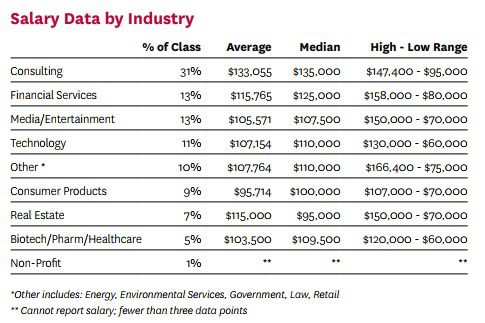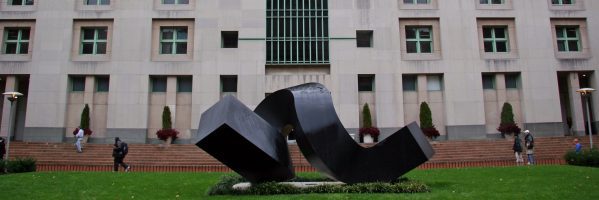Getting Paid: Highest MBA Salaries in Los Angeles

The transmissions Los Angeles sends back out into the ether are those culled from the desires of its inhabitants but also from the people who romanticize it from the outside. As Joan Didion once wrote, “The city burning is Los Angeles’s deepest image of itself.”
Los Angeles is, admittedly, polarizing. While some may find the not-so-authentic atmosphere of Hollywood to be a downtrodden, morose landscape, the city’s expansive diversity and subtle natural wonder is enthralling in its own right. In a way, it feels alien and utterly familiar all at once.
It’s this kind of uncertainty that makes Los Angeles an ideal place to pursue a business degree for a prospective MBA open to a bit of ambiguity. While Silicon Valley up north has traditionally been romanticized as a place where we can re-write the rules, LA has been catching up recently—and fast. Los Angeles has embraced the tech boom in a big way, with many Valley bigwigs and new startups alike moving their operations to Silicon Beach on the West Side. With that in mind, the new era of LA innovation is creating some lofty starting salaries, particularly for MBA graduates.
The Highest Los Angeles MBA Salaries
UCLA Anderson School of Management
Recent UCLA Anderson graduates earned an average starting salary of $121,250 with a $25,000 signing bonus, according to statistics released by the school. Over 92 percent of Anderson MBAs received job offers within three months of graduation. The top five industries to employ Anderson MBAs are in tech (30.6 percent); financial services (21.6 percent); consumer products (13.4 percent); and consulting services (13.4 percent). Top employers for Anderson graduates include: Amazon, Deloitte, Bank of America Merrill Lynch, Google, Microsoft, Adobe, Amgen, BCG, EY, Mattel, McKinsey & Company, Nike, PwC, Apple, AT&T, Autodesk, Citigroup, Credit Suisse, Epson, Goldman Sachs, Intel, Sony Pictures Entertainment, and Disney, among others
UC Irvine Merage School of Business
MBA graduates from the UC Irivine Paul Merage School of Business posted record employment numbers for the school. Over 90 percent of recent MBAs received job offers within three months of graduation. The most popular industries to attract Merage graduates were in technology (33 percent), finance (31 percent), consulting (24 percent), and marketing/sales (27 percent). Merage graduates with tech industry positions earned starting salaries of $105,000; consulting, $100,000; consumer products, $85,000; and financial services, $100,000. Top employers included: Amazon, AT&T, Bank of America, Cisco, Dell, Deloitte, Gap, Hulu, Hyundai, IBM, Mattel, NBC Universal, Taco Bell, Twitter, and Volcom.
USC Marshall School of Business
According to employment statistics surveying the most recent USC Marshall School of Business MBA class, the average starting salary for Marshall graduates is $115,309 with a $23,431 signing bonus. The top three industries that employ Marshall graduates are within consulting (34 percent), where MBAs start at $132,000; marketing/sales (27 percent), where MBAs start at $99,497; and financial services (18 percent), where MBAs start at $112,087. Top employers of Marshall’s 2016 class include: Adobe, AT&T, Apple, Citigroup, Deloitte, Disney, Facebook, Film Roman, Google, Hewlett-Packard, Intel, Morgan Stanley, Johnson & Johnson, Samsung, Taco Bell, Warner Bros, Starbucks, PwC, Sony Pictures, Nestle, and PepsiCo, among others.

USC Marshall grad salaries, broken down by industry.
Pepperdine Graziadio School of Business and Management
Pepperdine Graziadio School of Business and Management graduates earned an average starting salary of $120,000, according to school statistics. Around 82 percent of Graziadio MBAs accepted job offers within three months of graduation.
Financial services, entertainment, technology, and consulting were the top industries to employ Graziadio MBAs.
For more information on the best Los Angeles MBA programs, check out our guide to the city. As well, learn more about which LA schools do not require GMAT or GRE scores here.
Getting Paid: Highest MBA Salaries in Chicago

Like most parts of the country, the U.S. heartland is undergoing a massive shift on all fronts, becoming more urbane, diverse, and open to outsiders than seemingly ever before.
Many communities are becoming increasingly diverse, attracting international residents at an unprecedented rate. Young, urban professional-types who once flocked to the coasts are now moving in droves to Midwestern cities, which were once dismissively filed under “fly-over territory.” Nowhere is this change more apparent than in the Windy City.
Chicago’s long been home to major players in media, education, finance, and food and beverage (shout-out to Giordano’s Deep Dish Pizza), but doing business in the city now also means something new. Like most major metropolitan areas, Chicago’s slowly dipping its toes into the tech game; the city’s home to Groupon, Grubhub, Orbitz, and Reverb.
So, take your pick, aspiring MBAs! When it comes to Chi-City, you’ll be a veritable kid in a candy store.
The 5 Highest Chicago MBA Salaries
Northwestern Kellogg School of Management
Northwestern Kellogg School of Management graduates earned average starting salaries between $106,000-$138,000, depending on their chosen industry. According to recent statistics, the four most popular industries to attract Kellogg MBAs were consulting (32.6 percent), where the starting salary hovers around $138,204 with a $29,375 signing bonus. MBAs in tech (22 percent) earned a starting salary of $119,713 with a $23,749 signing bonus. MBAs that specialize in consumer products (13.8 percent) earned an average starting salary of $106,052 with a $26,634 signing bonus. MBAs in financial services (12.8 percent) earned an average starting salary of $128,090 with a $32,100 signing bonus. Top employers of Kellogg graduates include: Adobe Systems, Amazon, Anheuser-Busch, Apple, Bain & Co, Bank of America Merrill Lynch, Boston Consulting Group, Cisco Systems, DaVita Healthcare Partners, Dell, Deloitte, Facebook, General Motors, Goldman Sachs, Google, JPMorgan Chase, Linkedin, Mars, McKinsey & Company, Microsoft, Nike, PepsiCo, among others
DePaul Kellstadt Graduate School of Business
Recent graduates from the DePaul Kellstadt Graduate School of Business posted record employment numbers for the school. According to an overview the school published, 92 percent of 2016 MBAs landed positions within 120 days of graduation. The average starting salaries for Kellstadt’s available MBA concentrations are as follows: Accountancy at $83,000; economics at $90,000; finance at $89,000; management at $83,000; marketing at $75,500; and real estate at $75,000. The most popular industries to attract Kellstadt graduates were accounting, financial services, manufacturing, health care, and consulting. Top employers include: Allstate, Bank of America Merrill Lynch, Boston Consulting Group, Deloitte, Deutsche Bank, GE Capital, General Mills, Google, Groupon, JPMorgan Chase, Microsoft, PwC, United Airlines, and Wilson Sporting Goods, among others.
Notre Dame’s Mendoza College of Business
According to statistics surveying the most recent MBA class, the average starting salary for Mendoza College of Business graduates is $105,000 with a $20,000 signing bonus. About 91 percent of MBAs received job offers within three months of graduation. The most popular industries to attract Mendoza MBAs are within tech (27.1 percent), financial services (18.8 percent), consumer products (14.6 percent), and consulting (11.5 percent). MBAs working in tech earned average starting salaries of around $110,000; financial services, $110,000; consumer products, $100,000; and consulting, $105,000. Top employers of Mendoza MBAs include: Deloitte, Procter & Gamble, PwC, Deutsche Bank, IBM, Discover, Allstate, IBM, Samsung, Amazon, American Airlines, ExxonMobil, Johnson & Johnson, AT&T, Kraft, Hershey, Heinz, Bank of America Merrill Lynch, Major League Soccer, United Airlines, General Mills, General Motors, Microsoft, GlaxoSmithKline, and Citibank, among others.
University of Chicago Booth School of Business
Chicago Booth School of Business graduates earned an average starting salary of $125,000, according to recent statistics. The top industries to attract Booth MBAs are financial services (36 percent), consulting (27.5 percent), and technology (16.7 percent). Booth MBAs working in financial services earn average starting salaries of $125,000 with a $40,000 signing bonus; consulting, $145,000 with a $25,000 signing bonus; technology, $125,000 with a $30,000 signing bonus. Top employers of Booth graduates include McKInsey & Company (7.1 percent), Boston Consulting Group (4.7 percent), Amazon (3.9 percent), Bain & Company (3.1 percent), Accenture (2.6 percent), Google (2.4 percent), Bank of America Merrill Lynch (2.2 percent), and PwC Strategy (2 percent).
University of Illinois at Chicago Gies College of Business
On average, Gies College of Business graduates can expect to start their careers in the $90,000 range with a $10,000 signing bonus. According to statistics supplied by the school, MBA grads have a 94 percent employment rate. The most popular industries are technology (20.3 percent), financial services (18.8 percent), consulting (15.6 percent), and consumer products (12.5 percent). Liautaud MBAs who took positions in tech started at $94,000; financial services, $87,857; consulting, $89,125; and consumer products, $95,800. Liautaud graduates work for a broad range of companies, but top employers include AT&T, Johnson & Johnson, Walt Disney, Amazon, Chrysler, Hewlett-Packard, Sears, Google, State Farm, City of Champaign, Bank of America, and Whirlpool Corporation.
Building a Career after Graduation: Columbia Business School

Huzzah! You made it through the b-school ringer! Now ready for the fun part? Finding a job!
London Business School Launches More Flexible MBA

An MBA program needs to continuously evolve to stay relevant. That’s why most business schools reevaluate their curricula every few years to ensure that they’re on the cutting edge.
The London Business School recently completed a top to bottom review of its MBA program to determine how it could improve. The school found that while it has a strong employment outlook, conversations with students, alumni and recruiters revealed than an overhaul of the program itself would help to better meet the needs of students and employers.
Why the London Business School Updated Its Curriculum
“There were two drivers,” Gareth Howells, Executive Director of the MBA, MiF and Early Career Programs at LBS, tells us in an interview. “In terms of inputs, we were seeing a diversification in our pipeline of the professional aspirations of our students. Historically, 80-85 percent of our students went into consulting and finance, but what we’ve found is that more candidates are coming to LBS and considering a much more diverse set of companies: tech, not-for-profit, luxury retail, etc.”
The need for this change was also reflected on the employer side. Though LBS still has strong recruiting representation from finance and consulting, Howells reported that Google and Amazon have become two of LBS’ biggest recruiters. In fact, 22 percent of last year’s LBS MBA graduates went into tech-related roles.
These facts made a compelling case for updating the MBA curriculum. “We’re not moving away from finance and consulting, but we feel that there’s a way we could restructure the program to better serve our diverse candidates and recruiters,” Howells explains .
Growing the MBA Program
To start, one of the first things that LBS did to better serve its MBA students was increase the size of its program. In the past, LBS has been considered a relatively small to medium-sized program. Currently, it enrolls about 420 students each year but, starting next year, they’re planning to add about 60 more students.
“Obviously, that will take us into that medium-size,” Howells says. “We felt it was right that the MBA should grow. We want to attract a bigger market share of applications. Since the launch of our updated curriculum, we’ve posted a 12 percent increase in applications, and we’re expecting this class to be our highest quality class yet.”
One Size Doesn’t Fit All
The changes go far deeper than class size. “We wanted to give students the opportunity to customize their learning journey toward the business sector they’re most interested in,” Howells adds. “In addition, we also wanted to make the program more practical. We’re giving our MBA students a wide choice of courses so that they can choose to broaden and deepen their skills how they see fit.”
To keep up with the constantly changing global business environment, LBS reviewed all of its MBA courses, as well as the knowledge and skill sets that they felt were common to all industries—whether working at Google or Goldman Sachs. When they did this, they were able to pare down their core courses to a small set of “sector neutral” topics in areas such as teams, finances, etc. Core coursework now only comprises the first semester of the first year.
Then, by the second half of year one, students can tailor their studies to better fit their sector-specific interests. “This puts students and recruiters in the driver’s seat,” Howells says. “We offer courses on digital transformation, marketing, customer and market insights, value chain management, global economic analysis and more.”
There are also many new courses focused on digital competencies. According to Howells, recruiters said that they needed students who were comfortable with programming, coding and digital transformation. So, LBS developed a suite of courses around this technology—including FinTech—so that LBS MBA graduates are able to navigate the new digitally focused world.
Focusing on Practical Experience
In addition, LBS adjusted its courses to be more practically focused. “Just giving theory isn’t enough,” explains Howells. “Recruiters wanted students to have a more integrated and practical learning experience—pushing the dial from knowing to doing.”
To turn this practical focus into reality, LBS has added an on-the-ground London experience in year one. This new experience capitalizes on the school’s location to allow MBA students to undertake a business project with organizations around the city.
“Leveraging our London location is important,” says Howells. “London is a global finance leader as well as a great location for tech, finance, entrepreneurship and more. A lot of our projects will be drawn from all the sectors and students will be able to target the industry according to what they want to do.”
This experience is followed in year two by the global experiential experience. “Global is in our DNA. Ninety percent of our class is not from the UK,” says Howells. “We have over 70 different nationalities represented in our MBA program.” Recognizing this, LBS takes its MBA students on a global business experience to one of seven different locations around the world to learn in the local environment.
Flexible Scheduling
Flexibility in the length of the program was also important. “We wanted to give students the best possible chance of maximizing their career output,” he says. “So, we decided to offer multiple exit points for the MBA to offer students maximum flexibility.”
Too often, MBA students will complete an internship and be offered an immediate job with the company, and they want to start work sooner. Or, they find a job halfway through their second year and want to get a jump-start. With flexible 15-month, 18-month and 21-month exit points, each MBA student at LBS can choose what works best for them.
And LBS doesn’t make students choose their exit point at the start. They can change their schedule at any time and work with a counselor to determine what classes they need to complete to graduate when they want. “We put the student in the driver seat,” Howells notes. “We tell them what they need to do to achieve the exit time frame they want, but they have control over how they accomplish it.”
So far, the new program is being received well. LBS received more applications for their first class under the new design than in previous years, and Howells only expects that trend to continue.
“No one wants to be put in a box,” he says. “We provide opportunities for students to drive their learning journey. We’re giving them control.”
Getting Paid: Highest MBA Salaries in New York

As an international media and financial center, New York is teeming with opportunities for both prospective b-schoolers and MBA graduates alike. The New York metro area is a plethora of high-quality MBA programs that cater to any number of business interests, which lead to some well-paid job opportunities.
Metro Jobs Report: Career Advice, Goldman Troubles and More

Let’s dig into the latest job news …
